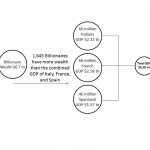Published on Oxfam America’s Politics of Poverty blog.
The world is experiencing an immense problem with wealth inequality, and it’s not just a problem of economics, it’s a problem of power.
This blog was co-authored by Stephanie Fontana, a Research Intern at Oxfam America.
The world’s richest 1 percent now own more wealth than all of the bottom 99 percent combined. This finding comes from Credit Suisse’s Global Wealth Report for 2015, released last week. Last year, Credit Suisse found the richest 1 percent of adults owned 48 percent of global wealth. According to the new report, the top 1 percent now hold 50.4 percent of all the world’s household wealth.
